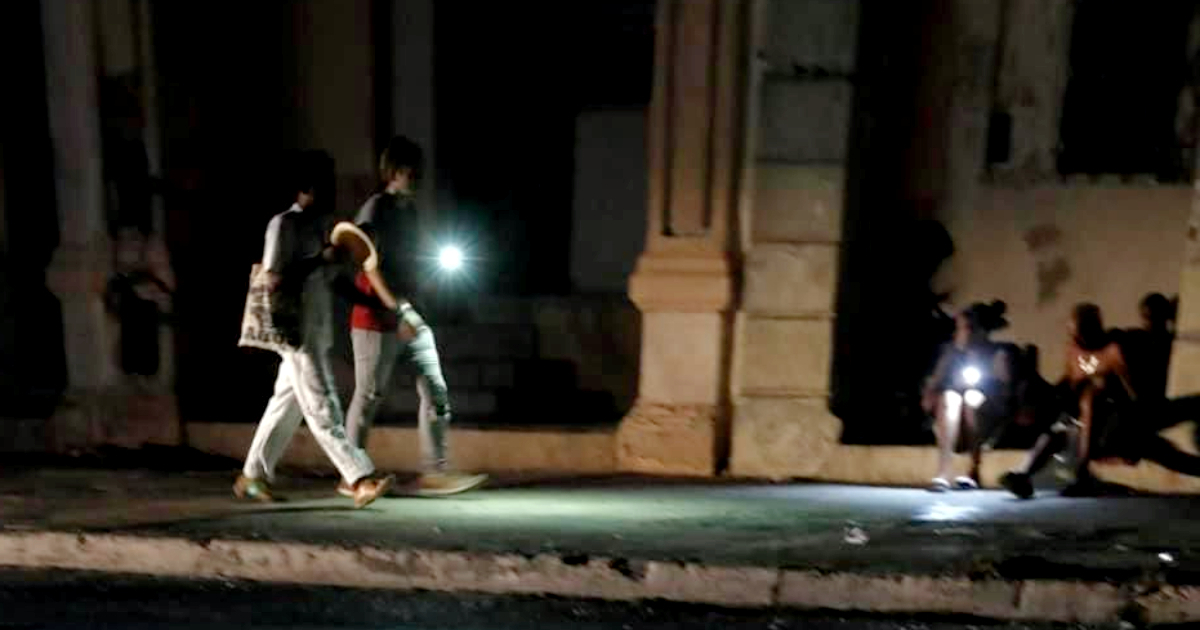The frustration over extended power outages in Havana and other Cuban provinces is on the rise, as evidenced by user comments on a recent post by the Union Electrica (UNE) announcing the restoration of service in nearly half of the circuits. Following the passage of Hurricane Rafael and its impact on the country’s already fragile electrical infrastructure, hundreds of thousands of Havana residents have been left without power for more than 72 hours, sparking a wave of complaints and grievances on social media.
Despite being a priority for the restoration of electricity, the Cuban capital continues to face severe issues, as highlighted by several frustrated netizens in their comments on UNE's social media pages. One user expressed her frustration, noting that her area at 23rd and 42nd streets had been without power for over 80 hours, with no fallen cables to explain the delay.
Impact Beyond the Capital
The discontent is not limited to Havana. A resident from Arroyo Naranjo described how the food in his home is spoiling after four days without electricity, underscoring the desperation and helplessness in the face of a lack of response. Another user pointed out the neglect of the rest of the country, stating, "All they care about is Havana, while the eastern region is still suffering from blackouts."
Provinces further from the capital, such as Pinar del Río and Camagüey, have also experienced up to 72 hours without service. One user skeptically remarked, "If this is the situation in Havana, I don't want to imagine when Artemisa will see service restored."
Criticism of UNE's Management
Complaints have not only focused on the absence of electricity but also on the lack of effective management and communication by the UNE. From Playa Querejeta, a Cuban resident criticized the slow pace of repairs, describing how food and essential goods are going to waste due to the inability to preserve them without power.
In Miramar, a neighbor warned of the dangers posed by fallen electricity poles after the hurricane, echoing many others. "A tree has fallen across the street, and the electrical wiring is on the ground; not a single vehicle has been seen working or assessing the situation," he reported.
Perceived Inequality in Resource Allocation
Another recurring complaint is the perceived inequality in the distribution of resources. One user emphasized, "It's disrespectful to publish that only 48% of circuits are restored, yet look at the amount of MW served in the capital while other provinces endure blackouts exceeding 14 hours a day." This perception of inequality has fueled a sense of neglect in communities far from Havana.
Another user mentioned that UNE vehicles passed by without stopping after reporting an explosion in the power lines, criticizing that they only warned residents to ensure no one stole the cables because "there wouldn't be replacements," ignoring the potential danger of the scenario.
Voices from Social Media
Here are some of the comments left by users on UNE's social media:
- "If it's at 48% with 312 MW, Havana consumes almost all the country's power; no wonder we have to stay in the dark every day."
- "In Marianao, we have a block and a half without power due to a tree that fell four days ago and hasn't been removed."
- "Thanks to the capital, the rest of the country is sinking again."
- "We've been without power for more than 72 hours, with electrical wiring in the street. When someone gets hurt, then they’ll take action."
- "All they care about is Havana, and in Pinar del Río, we've been 72 hours without power and no hope of connecting to the SEN."
- "Havana alone consumes 700 MW. Imagine in Cienfuegos with just 50 MW, almost everything shuts down."
- "They need a special thermoelectric plant just for them."
- "Part of Nuevo Vedado has been without service for nearly 72 hours."
- "In Centro Habana, they haven't pumped water; we've been five days without it."
- "Havana only experiences blackouts of this magnitude due to weather conditions; otherwise, never in their dreams."
Protests Erupt in Cuba's Capital
Protests over the prolonged blackouts in Cuba have gained momentum in recent weeks, marked by the sound of banging pots and demonstrations in various Havana neighborhoods. This past Friday, residents of Nuevo Vedado staged a protest filled with the noise of pots and demands for the restoration of electricity after more than 72 hours without power.
Elsewhere in the capital, residents of Guanabacoa also raised their voices in a pot-banging protest, highlighting the widespread frustration. Facing power cuts that severely impact their quality of life, citizens used this form of protest to make their situation visible and demand immediate solutions.
The protests in these locations underscore the critical state of the country's electrical infrastructure and the authorities' inability to restore service promptly. This dissatisfaction has spread to other parts of the island, where prolonged interruptions and a lack of effective communication from the UNE foster a sense of abandonment and despair.
The peaceful demonstrations and use of pots as a symbol of protest reflect the resilience of Cubans in the face of an ongoing energy crisis that remains unresolved. The increase in such actions demonstrates that Cubans are losing patience and, in many cases, risking reprisals to assert their right to a dignified living condition.
